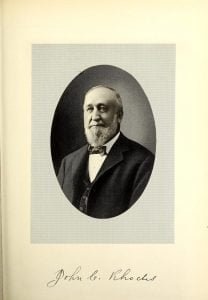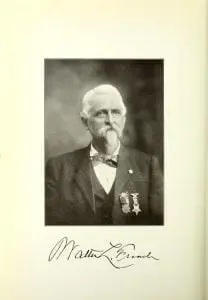Genealogy of the Rhodes Family of Taunton Massachusetts
Through much of the century but recently closed and on into this has dwelt in Taunton and New Bedford, Mass., a family bearing the name of Rhodes. Reference is made to some of the descendants of the late Stephen and Anna Daniels (Carpenter) Rhodes, whose birthplaces were Dedham and Foxboro, Mass., respectively. Their son, Stephen Rhodes (4), became the head of the Taunton family, several members of which in succeeding generations have given a good account of themselves in the business and social life of their community, rising to useful and substantial citizenship, and as well to responsible public trust. The names of Hon. Stephen H. Rhodes, of Boston, late president of the John Hancock Insurance Company, who for years was prominent in the activities of Taunton, a member of the board of aldermen some forty years ago, and mayor of the city for one or two years; his brother, the present John Corey Rhodes, one of the best known manufacturers of southeastern Massachusetts; another brother, the present Marcus Morton Rhodes, Esq., who for perhaps a half century or more has been actively engaged in business in Taunton, and the greater part of the period as a senior member of the firm or corporation of M. M. Rhodes & Sons Company, and at one time one of the board of water commissioners of the city; the latter’s son, George Holbrook Rhodes, long a partner and stockholder of the firm and corporation just alluded to, and for years its treasurer, many years in succession a member of the common council of Taunton and for a number of years president of that body; John Bird Rhodes, son of John Corey Rhodes, chief executive of John C. Rhodes & Co., Inc., of New Bedford; and perhaps others as well, ever stand out prominently in the annals of Taunton.


